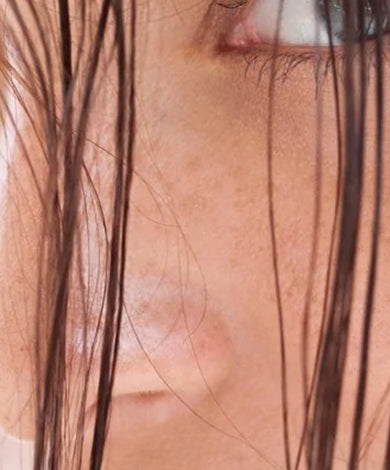Free Pouch & Gloves on orders ₹1999+
Free Skin Care Planner 2026 on ₹2499+
Free shipping on all orders
Free Trial-Kits on all orders
₹ 0
₹ 0
₹ 0
Free Pouch & Gloves on orders ₹1999+
Free Skin Care Planner 2026 on ₹2499+
Free shipping on all orders
Free Trial-Kits on all orders


SOLUTIONS & TREATMENTS
Dandruff can be light, moderate or severe. This condition is extremely common and affects women more than men. It can appear at any time. People with all types of hair and scalp are affected. This excessive scalp desquamation is caused by either a yeast colonisation (= fungus) or a genetic predisposition brought to light by environmental factors.

Dandruff results from the abnormal proliferation of a micro-organism from the Malassezia family, which is a yeast. This phenomenon causes skin cells in the epidermis to renew much too quickly. They appear in clumps on your scalp, forming large dandruff or patches that fall off or become sticky. They look oily and yellowish-grey.
This can be accompanied by an extremely irritated scalp and intense itching. Dandruff is visible in your hair and, in most cases, falls onto your neck and shoulders, particularly during styling. Fatigue, stress, pollution and the winter are factors that can promote or increase malassezia furfur proliferation and thus the appearance of dandruff.
There are two types: dry dandruff and oily dandruff.
The way they look provides information about the root cause of the issue.
If you have concerns about severe dandruff, contact your dermatologist.

Psoriasis is characterised by severe scales with dry areas that appear as thick, clearly-defined patches - particularly on the edge of the scalp - and are round or oval-shaped, with redness and scales. These scales vary in size and can resemble a helmet covering the whole scalp.
They are silvery white, compact, dry and particularly sticky. They are generally accompanied by intense itching.

Genetic predisposition, stress, certain infections (eyes, nose and throat and dental in particular), and the use of certain medicines (lithium, synthetic anti-malarials, beta-blockers, etc.) can play a role in the appearance of severe scales with dry areas.





Scales can be related to two diseases: seborrhoeic dermatitis and psoriasis.
1. With seborrhoeic dermatitis, It appears as redness on the face, with or without couperosis (small dilated blood vessels on the cheeks and nose, called telangiectasias). This redness may sporadically be accompanied by vasomotor flushes, i.e. sensations of hot flushes on the face that quickly dissipates.

2. Psoriasis is not caused by a fungal proliferation;rather, it is a completely different condition related to a genetic predisposition brought to light by environmental factors.
Wash your hair and scalp 2 to 3 times a week with a mild shampoo containing:
Try not to scratch your scalp so you do not make its condition worse. An suitable medicated shampoo generally soothes the scalp.
Wash your hair and scalp several times a week with an extra-high-tolerance medicated shampoo containing:
Try not to scratch your scalp so you do not make its condition worse. A suitable medicated shampoo generally soothes an itchy scalp.
Wash your hair and scalp with an extra-high-tolerance medicated shampoo containing:
This shampoo should be used 2 to 3 times a week to treat intense dandruff (for 15 to 21 days), then once or twice a week as prevention, alternating with a mild shampoo.
Dry your hair carefully. If using a blow dryer, make sure it does not blow air that is too hot so as to not irritate your scalp.
Try not to scratch your scalp so you do not make its condition worse.